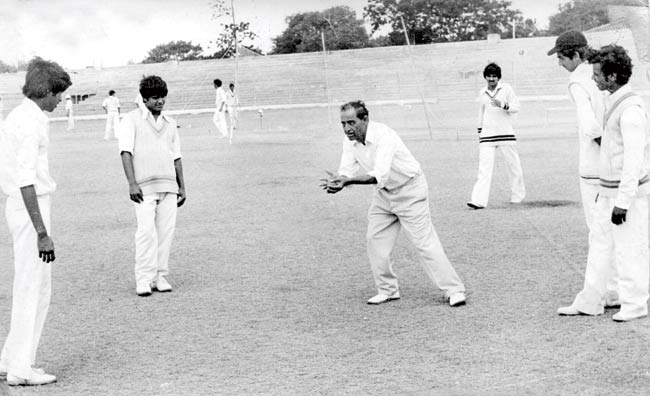Colonel Hemu Adhikari figures third in the alphabetical list of Indian Test cricketers after Varun Aaron and S Abid Ali. He deserves a place at the top in terms of contribution to his country’s cricket as well

 Colonel Hemu Adhikari figures third in the alphabetical list of Indian Test cricketers after Varun Aaron and S Abid Ali. He deserves a place at the top in terms of contribution to his country’s cricket as well.
Colonel Hemu Adhikari figures third in the alphabetical list of Indian Test cricketers after Varun Aaron and S Abid Ali. He deserves a place at the top in terms of contribution to his country’s cricket as well.
Adhikari, who passed away in 2003, would have been 95 today. Although he was a recipient of the BCCI’s C K Nayudu Lifetime Achievement award in 1999, Adhikari is probably forgotten for his efforts.
ADVERTISEMENT
His Test record is modest - 21 matches, 872 runs at 31.14, but he had his share of highlights.

Colonel Hemu Adhikari giving his wards some catching tips at one of the many National camps he spearheaded in the 1970s. Pic/mid-day archives
In 1948-49, against John Goddard’s West Indians at the Kotla in Delhi, Adhikari cracked 114 in 245 minutes but couldn’t save India from following on despite Lala Amarnath’s men totalling 454 in response to West Indies’ 631. In A Long Innings, Hazare was moved to write: “He scored an unbeaten 114, as valuable and fighting a century you can hope to see.” And Jeff Stollmeyer, the West Indies opening batsman, wrote in his West Indies in India diary: “He was fighting all the way. Lucky in parts, but a very plucky innings.”
A decade later at the same Kotla, Adhikari became India’s fourth captain for the 1958-59 series against West Indies. He scored 63 and 40 apart from claiming three wickets in a drawn Test so he couldn’t be accused of not leading by example. It happened to be his last Test; ditto for 44-Test stalwart Vinoo Mankad. Adhikari was a splendid cover point fielder.
Adhikari came into prominence again when India toured England in 1971 as manager of Ajit Wadekar’s victorious side. Wadekar paid rich tributes to the Colonel on Tuesday: “Adhikari was different. Apart from ensuring everyone woke up on time, he also helped in terms of strategy. At nets, he left the batting and bowling but looked after the catching practice which was vital.” Wadekar’s off-field deputy was a disciplinarian. The skipper recalled him keeping a watch on when players returned from dinner invitations and even parked himself in the bar to check if any player hung around there for long. Doubtless, he became unpopular with some players, but Wadekar stressed that the team required to be disciplined in order to get the best results. Beating England on their home soil was a heavyweight of an achievement. This was the same team led by Ray Illingworth, which regained the Ashes Down Under in 1970-71.
India won 1-0 and Adhikari was reappointed manager for its next Test tour which interestingly came a good three years later — to England in 1974. It was a highly forgettable English summer in which Wadekar’s men lost 0-3 and endured a series of embarrassing off-field incidents. Adhikari faced criticism and ridicule from the media and even his own players.
That very year, the Indian board appointed Adhikari as national coach. It is in this capacity that he made a great impression on the next crop of Indian cricketers. In the BCCI’s Golden Jubilee (1929-79) souvenir, then president M Chinnaswamy wrote: “Players like Kapil Dev and Yashpal Sharma underwent stints of coaching annually under this scheme and it would be difficult to assume that they were not benefited by the Board’s coaching scheme.”
Roger Binny, Yograj Singh, Ravi Shastri and Kiran More too were part of these camps. Wicketkeeper More remembered that no player could quench his thirst before a scheduled break and every day of the camp entailed hard labour. There was more to Adhikari’s teachings than batting, bowling and fielding. And More is also grateful to Adhikari for showing him how to use the knife and fork at the dinner table.
Over the years, one heard a couple of humorous stories concerning Adhikari. Fred Trueman, the England pace terror was believed to have told Adhikari who he met for the first time in 1971 after the pace great’s successful 1952 series in England: “Glad to see you’ve got your colour back, Colonel.”
In the same summer, when the Colonel reportedly imposed curfews on his team members, a player sharing a room with the flamboyant Farokh Engineer placed pillows under a bed sheet and hoodwinked Adhikari into believing Engineer was asleep when the Colonel came on his rounds. Adhikari always had players from different states sharing rooms.
Indeed, Indian cricket must never forget Colonel Hemchandra Ramachandra Adhikari.
Clayton Murzello is mid-day’s Group Sports Editor
 Subscribe today by clicking the link and stay updated with the latest news!" Click here!
Subscribe today by clicking the link and stay updated with the latest news!" Click here!







